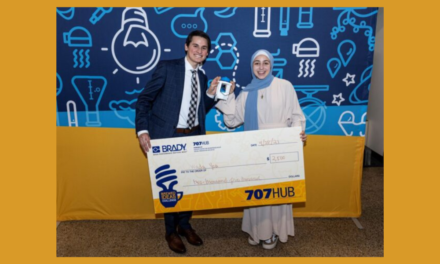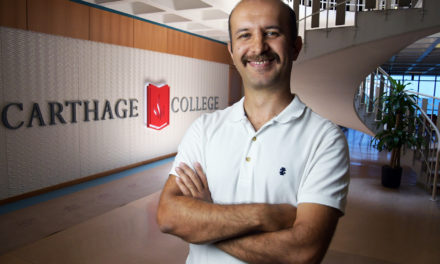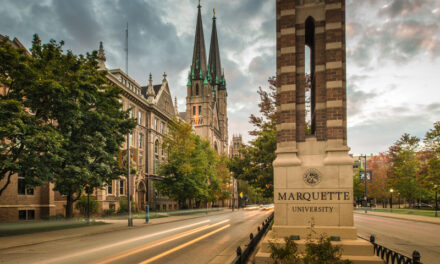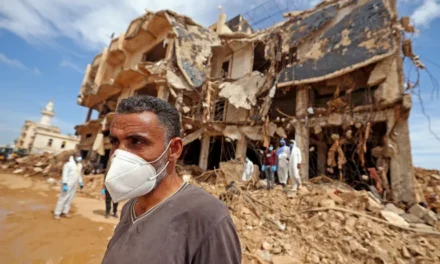
Rev. Lisa Bates-Froiland waits to speak at a demonstration for Palestinian rights in Milwaukee, wearing a shawl given to her by a family she met in Dheisheh, a Palestinian refugee camp, “where people are living in the third and fourth generations.”
For the first time in her life, Rev. Lisa Bates-Froiland, pastor of Redeemer Lutheran Church in Milwaukee, spoke at a demonstration for Palestinian human and civil rights.
Several hundred people gathered in Milwaukee May 15 to commemorate the 74th anniversary of the nakba, the expulsion of hundreds of thousands of Palestinians from their homes and ancestral lands by the Israelis. Veteran Palestinian American journalist Shireen Abu Akleh had been killed four days before. That’s when Bates-Froiland publicly took a stand.
“I don’t know that many American Christians see what I saw three weeks ago,” Bates-Froiland told the crowd. She had recently returned from her first trip to the Occupied Palestinian Territories where she visited her daughter who works as a communications officer for the Lutheran bishop in Jerusalem. “They do not see the monstrous wall that runs like a scar through what were beautiful valleys and fields. They haven’t seen the heavily armed presence and intimidation.
“My daughter goes through a checkpoint every day and it is easy for her. She just shows her American passport. But so many of the people that she loves, that she works with, either cannot go at all or are hassled by young people carrying AK-47s.
“My daughter attended the funeral for Shireen. And just a few days ago, I walked with my own feet into the Old City of Jerusalem, where her funeral procession was so brutally interrupted on her way to the Catholic church. So, it is time for me. I won’t be quiet any longer.”
Bates-Froiland will be the featured speaker this Friday at the Milwaukee Muslim Women’s Coalition’s Networking Brunch. In her talk, “An American’s First Look at Life in Palestine,” she plans to share what she saw during a 9-day visit this spring to the Occupied Palestinian Territories. See more information about the brunch and register here.
Wisconsin Muslim Journal interviewed Bates-Froiland in May at Redeemer Lutheran Church in Milwaukee, where she has served as pastor since 2011. She shared what she witnessed first-hand and why she now feels compelled to stand up for Palestinian rights.
You and your husband were recently in the West Bank to visit your daughter, Maddi Froiland, a communication officer for the Lutheran bishop in Jerusalem. How did she end up in that post?
Maddi’s involvement began with an Evangelical Lutheran Church of America program called “Young Adults in Global Mission.” Just out of college in 2019, she signed up and was assigned to Jerusalem that fall, where she worked with an environmental center and schools. She was sent home in March 2020 because of the pandemic but she felt she had unfinished business there. When this communication officer position opened, she applied.
She began that work in July 2021. It is a three-year post. She feels fulfilled in her work and has many meaningful relationships there.
Tell us about your trip.
We had Easter Sunday services here and then we got on a plane that afternoon. Maddi met us at the Tel Aviv airport, then we traveled by train to Jerusalem. After that, we took a tram and a bus. She knows all the public transportation because she does it every day. We arrived at Maddi’s and then took a 90-minute nap. In the evening, we walked to the birthplace of Jesus, the Church of the Nativity in Bethlehem.
We had planned to go into Jerusalem the next day but there were clashes during the confluence of Ramadan, Passover and leaning into Orthodox Easter. We were told we might want to stay away from Jerusalem for a few days. Instead, we visited some of the families she knows from the schools.
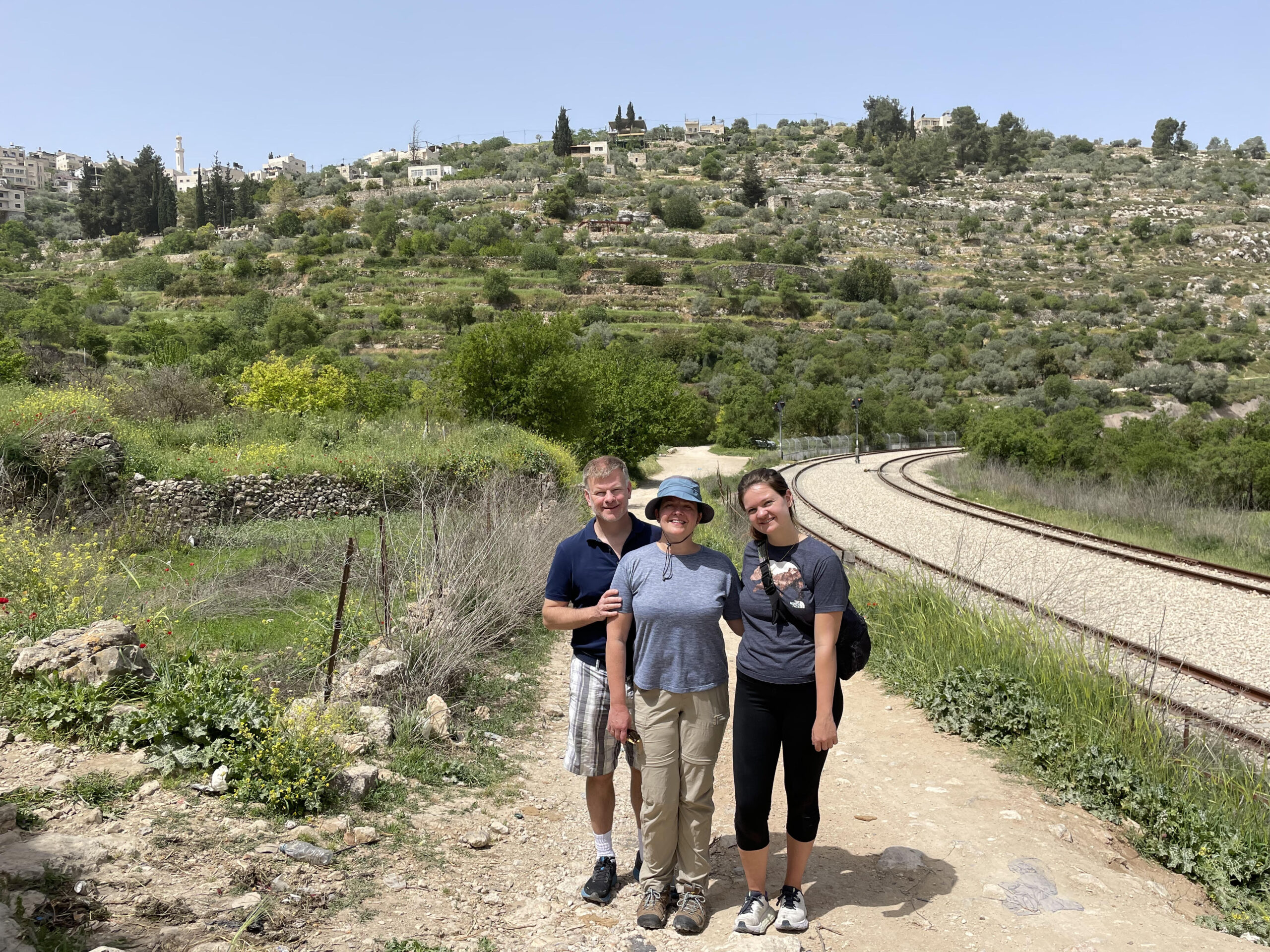
David Froiland, Lisa Bates-Froiland and Maddi Froiland take a guided hike to Battir Village, a UNESCO World Heritage site famous for its irrigation system that dates back to Roman times.
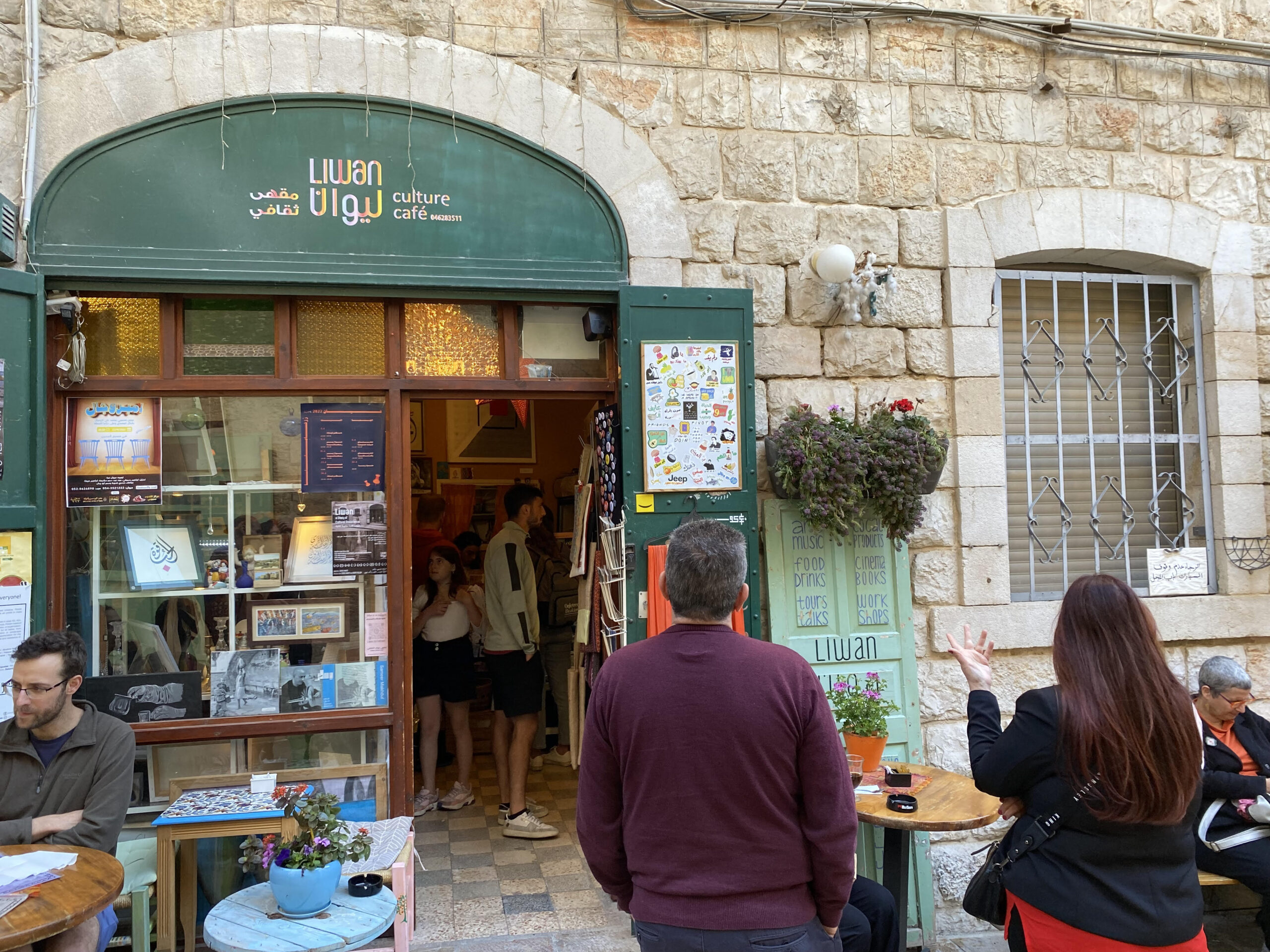
Maddi Froiland takes her parents to Liwan Culture Cafe in Nazareth, a grassroots collective that has become a hub for Palestinian artists, musician, and activists.
We also took a road trip many Christian Palestinians are not allowed to take—to Galilee and Nazareth, the hometown of Jesus. I can go there with my American passport but the people who are the descendants of those who originally heard the gospel message of Jesus cannot travel to see where that gospel was first preached. They won’t ever be able to do that.
A few days later, I helped to serve communion at the Redeemer Lutheran Church of Jerusalem. Then we walked the Old City and visited the Church of the Holy Sepulchre, Al Aqsa Mosque, the Mount of Olives and the Garden of Gethsemane. We walked along the Via Dolorosa, the path that Jesus took towards the cross. The sun was setting and it was Ramadan, so suddenly the place became flooded with people all heavily laden with food, full of energy and enthusiasm as they were going home to break their fasts. It was delightful.
What made you decide to start speaking out in advocacy for Palestinian human and civil rights?
Given my eyewitness experience of being in the Palestinian Territories and crossing the borders, seeing how policed it is, how limited the lives Palestinians are—for instance, they can’t dig down more than three feet in the ground for irrigation or building purposes. Yet, when a hillside is taken over by settlements that the international community has said are illegal, the settlers have swimming pools.
Or if a family doesn’t have the ability to farm their land and it is seen to lay fallow for three years, it can be taken away from them. There are just so many injustices built into this system, created without the acquiescence of the Palestinian people, and yet they must live under these rules.
I met many, many Palestinians. I met teachers, storekeepers, people who had lived on and farmed the land for generations. I saw people just wanting to have a peaceful, non-threatened life and livelihood for their children.
How did this trip change your own perceptions about the plight of Palestinians?
In so many ways. For example, I didn’t know before I saw it how the traditional living arrangements of Palestinian families incorporate extended families. They occupy a large structure with floors devoted to certain branches. They live together with multiple generations. That’s why, even under challenging circumstances, it is difficult for them to leave. I think the American perspective is if it is that hard, just leave and go somewhere else. That is so counter to the way they have been living for many generations.
How did you communicate with the people you met?
Some spoke English but Maddi speaks Arabic, as well as Norwegian and German, which she studied in college and high school respectively. Those languages help her in her work with international partners. She continues to be tutored in Arabic by an adorable 86-year-old woman named Nadia, whose grandfather was one of the founding members of the first Lutheran church there. She talks about the lands her family once held and farmed.
So many families told us Maddi is like a daughter to them. As a mother, I loved feeling like she has a wide and deep support network all around her.
Tell us more about what you saw that led you to take a stand for Palestinians.
I’ve been listening to Maddi for years now and I work with the Interfaith Conference of Greater Milwaukee. It has always been on my mind—how do I carve out a space that is pro-Palestinian and supports Palestinian rights while navigating my Christian identity and relationships with those of the Jewish faith here. I recognized it’s not quite as difficult as I thought. It’s really a matter of addressing the human and civil rights problems and the occupation.
Having seen it with my own eyes, talked to the people, heard their stories directly—that convinced me that I, even with my limited engagement, can at least say this is what I saw. I was surprised to see 19-and-20-year-olds with AK-47s who have full authorization to determine whether someone gets to go to work on a given day.
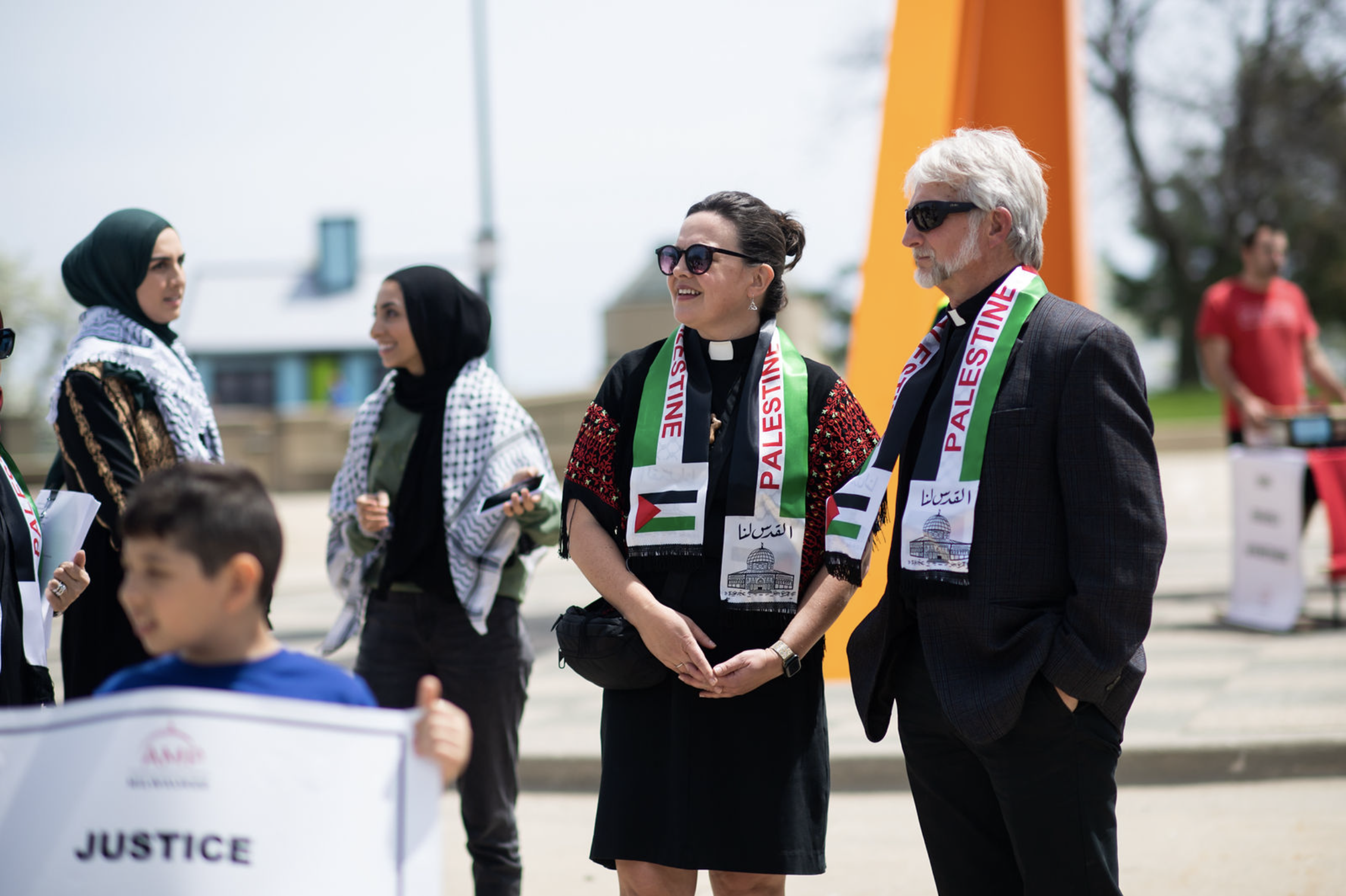
Lisa Bates-Froiland, paster of Redeemer Lutheran Church, and Jon Jacobs, an Evangelical Church of America pastor, were among 20 who spoke at a May 15 rally for Palestinian rights.
And that the wall is becoming more of a presence. And the settlements. I would look out at a valley or hill and someone would say to me, all that housing was not there five years ago. The United Nations has said none of it is supposed to be there.
We also toured Dheisheh, a Palestinian refugee camp located just south of Bethlehem. It was established in 1949, when people were taken from several villages and moved to this camp. It started as a temporary refugee but the people were never resettled and started building concrete structures. Now a fourth generation is being born in this refugee camp. Maddi has friends living there who told us that the Israeli military will go through the camp, even though they don’t have the authorization to do so. It is a kind of intimidation. It was a similar thing happening in Jenin when Shireen Abu Akleh was killed.
You said what you are learning is reformulating the narrative you were raised with. Can you tell us more about that?
The narrative I, and I think most American Christians, were raised with is that Israel deserves this land, coming out of the Holocaust. And there’s nothing wrong about what they’re doing because they’re constantly under threat by more powerful forces. They have to do everything they can to defend themselves because of their long legacy.
Now that narrative is being challenged by news reports from other perspectives and what Maddi shares with me. Now there are two perspectives and that raises questions.
On Tuesday mornings, I’ll do a morning prayer on Facebook live. We do prescribed readings from the scriptures and lately we’ve been in the part where Moses is leading the Israelites to the promised land, when they send in spies. I thought, wait, there are already people there! It raises a question. You may feel called to a certain area but what do you do about the people who are there in a way that’s faithful.
I don’t have answers; I am just raising questions. I know it’s deeply, deeply complex.
Are you receiving any pushback for standing up for Palestinians’ rights?
It’s too early to know.
Do you have any fear about taking a stand?
Just if I don’t explain myself well enough and someone misunderstands and thinks that what I’m saying is antisemitic or anti-Jewish. I want to be very clear about that.
I want to make sure my advocacy is very clear—that it is in no way, shape or form anti-Jewish. I revere the Jewish tradition. That faith family is cousin to my own, as is the Muslim faith. Instead, my advocacy is against a wall cutting through the country, AK-47s in the hands of these young people and a way of life I saw that was unnecessarily dispiriting and inconvenient.
I also want to be very clear—I’m a pacifist and I cannot support violence of any kind on either side.
And especially because I’ve only been there for my first visit. I just want to talk about my eyes opening to things I didn’t realize were there.
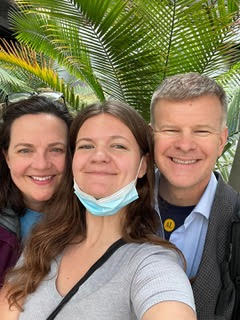
Maddi Froiland (center) met her parents, Lisa Bates-Froiland, and David Froiland at the Tel Aviv airport April 19 at the start of her parents’ 9-day visit.
Rev. Lisa Bates-Froiland, pastor at Redeemer Lutheran Church in Milwaukee (ELCA), will be the featured speaker at the Milwaukee Muslim Women’s Coalition’s Networking Brunch, 10 a.m. – noon, Friday, June 24.
In her talk, “An American’s First Look at Life in Palestine,” she plans to share what she saw during a 9-day visit this spring to the Occupied Palestinian Territories. See more information about the brunch and register here.
